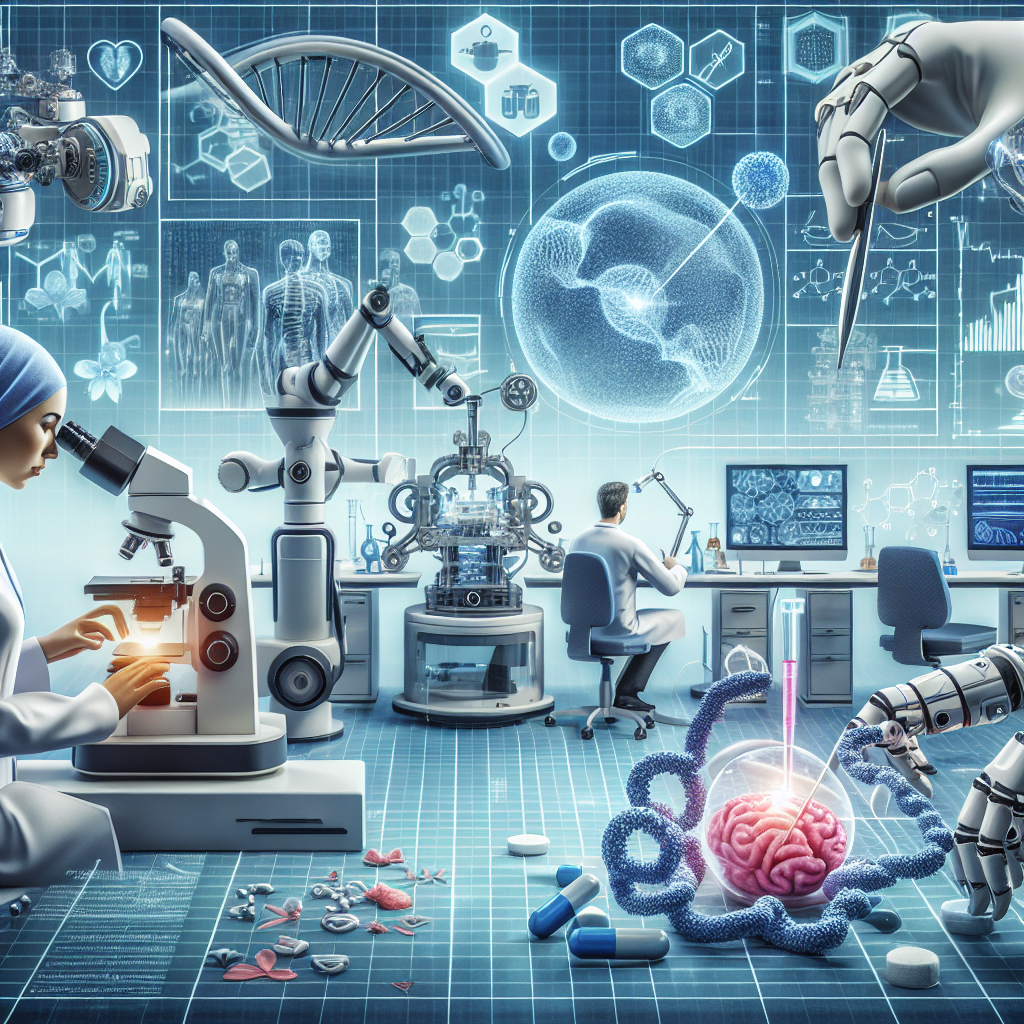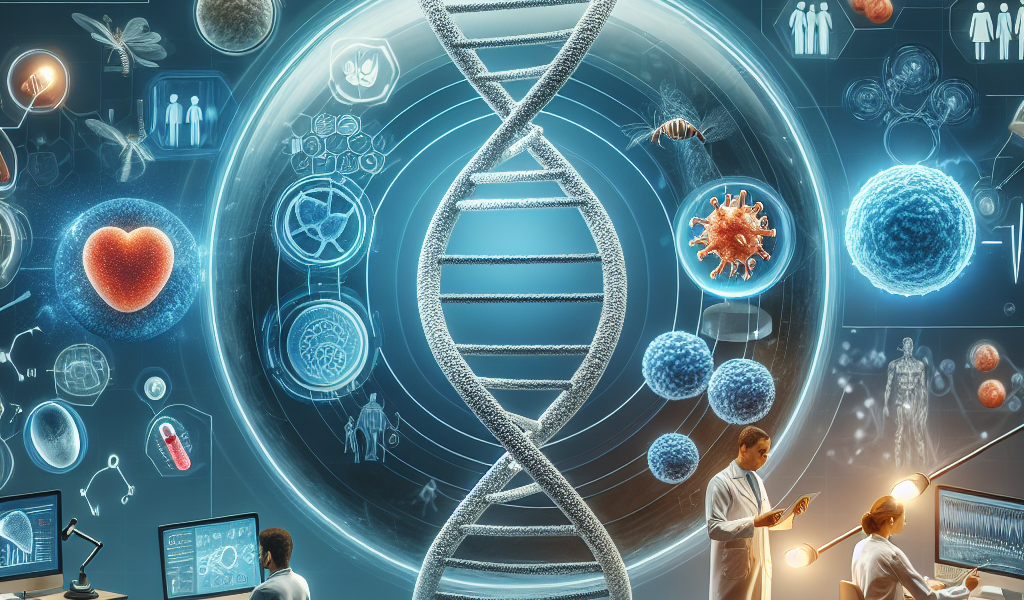-
Table of Contents
“Revolutionizing Healthcare: Precision Medicine Through Advanced Technology”
Introduction

Precision medicine, an innovative approach to tailoring medical treatment to the individual characteristics of each patient, is being significantly advanced by cutting-edge technology. By leveraging advancements in genomics, big data analytics, and artificial intelligence, healthcare providers can now offer more personalized and effective treatments. Genomic sequencing allows for the identification of genetic mutations that may influence disease and treatment response, while big data analytics enables the integration and analysis of vast amounts of patient data to uncover patterns and predict outcomes. Artificial intelligence further enhances precision medicine by providing sophisticated algorithms that can analyze complex datasets, leading to more accurate diagnoses and treatment plans. Together, these technological advancements are transforming the landscape of healthcare, making it possible to move away from the one-size-fits-all approach and towards more individualized care that improves patient outcomes and reduces healthcare costs.
The Role Of Artificial Intelligence In Precision Medicine
Artificial intelligence (AI) is revolutionizing various sectors, and healthcare is no exception. One of the most promising applications of AI in healthcare is in the realm of precision medicine. Precision medicine, which tailors medical treatment to the individual characteristics of each patient, is being significantly enhanced by AI technologies. This synergy between AI and precision medicine is not only improving diagnostic accuracy but also personalizing treatment plans, thereby transforming patient outcomes.
To begin with, AI’s ability to analyze vast amounts of data quickly and accurately is a game-changer for precision medicine. Traditional methods of data analysis are often time-consuming and prone to human error. However, AI algorithms can sift through complex datasets, including genetic information, medical histories, and lifestyle factors, to identify patterns that might be missed by human eyes. For instance, machine learning models can analyze genomic data to pinpoint specific genetic mutations associated with certain diseases. This capability allows for earlier and more accurate diagnoses, which is crucial for conditions like cancer, where early detection can significantly improve survival rates.
Moreover, AI is enhancing the development of personalized treatment plans. By integrating data from various sources, AI can help doctors understand how different patients might respond to specific treatments. This is particularly important in oncology, where the effectiveness of treatments can vary widely among patients. AI can predict which therapies are likely to be most effective based on a patient’s unique genetic makeup and other factors. This not only increases the chances of successful treatment but also minimizes the risk of adverse side effects, making the treatment process more efficient and less taxing for patients.
In addition to diagnostics and treatment planning, AI is also playing a crucial role in drug discovery and development. Traditional drug development is a lengthy and expensive process, often taking years and billions of dollars to bring a new drug to market. AI can expedite this process by identifying potential drug candidates more quickly and accurately. Machine learning algorithms can analyze existing drugs and their effects on various diseases, suggesting new uses for old drugs or identifying compounds that might be effective against specific conditions. This accelerates the development of new treatments and brings them to patients faster.
Furthermore, AI is facilitating more effective patient monitoring and follow-up care. Wearable devices and mobile health applications can collect real-time data on patients’ vital signs, activity levels, and other health metrics. AI can analyze this data to detect any anomalies or changes in a patient’s condition, allowing for timely interventions. This continuous monitoring is particularly beneficial for managing chronic diseases, where early detection of complications can prevent hospitalizations and improve quality of life.
Despite these advancements, the integration of AI in precision medicine is not without challenges. Issues such as data privacy, the need for large and diverse datasets, and the potential for algorithmic bias must be addressed to ensure that AI applications are both effective and equitable. However, ongoing research and collaboration between technologists, healthcare providers, and policymakers are paving the way for overcoming these hurdles.
In conclusion, the role of artificial intelligence in precision medicine is multifaceted and transformative. By enhancing diagnostic accuracy, personalizing treatment plans, accelerating drug discovery, and improving patient monitoring, AI is making precision medicine more effective and accessible. As technology continues to evolve, the partnership between AI and precision medicine holds immense promise for the future of healthcare, offering hope for better patient outcomes and a more personalized approach to treatment.
Genomic Sequencing And Its Impact On Personalized Healthcare
In recent years, the field of precision medicine has experienced a transformative shift, largely due to advancements in genomic sequencing. This cutting-edge technology is revolutionizing personalized healthcare by enabling medical professionals to tailor treatments to individual patients based on their unique genetic makeup. As a result, the traditional one-size-fits-all approach to medicine is gradually being replaced by more customized and effective strategies.
Genomic sequencing involves decoding the complete set of DNA in an individual, which provides a comprehensive map of their genetic information. This process has become faster and more affordable, thanks to technological innovations. The Human Genome Project, completed in 2003, was a monumental milestone that took over a decade and billions of dollars to map a single human genome. Today, the same task can be accomplished in a matter of days for a fraction of the cost. This accessibility has opened the door for widespread use of genomic data in clinical settings.
One of the most significant impacts of genomic sequencing on personalized healthcare is its ability to identify genetic mutations that may predispose individuals to certain diseases. For instance, mutations in the BRCA1 and BRCA2 genes are well-known indicators of an increased risk for breast and ovarian cancers. By identifying these mutations early, healthcare providers can recommend proactive measures such as increased surveillance, lifestyle changes, or even preventive surgeries. This preemptive approach can significantly improve patient outcomes and reduce the overall burden of disease.
Moreover, genomic sequencing is playing a crucial role in the field of oncology. Cancer is a complex disease characterized by genetic mutations that drive its growth and spread. By sequencing the genomes of cancer cells, doctors can identify specific mutations that are driving the disease in a particular patient. This information allows for the development of targeted therapies that specifically address those mutations, leading to more effective and less toxic treatments. For example, the drug Herceptin is used to treat breast cancer patients whose tumors overexpress the HER2 protein, a condition that can be identified through genomic testing.
In addition to cancer, genomic sequencing is making strides in the treatment of rare genetic disorders. Many of these conditions are caused by single-gene mutations, and identifying the exact genetic cause can be challenging. However, with the advent of whole-genome sequencing, it is now possible to pinpoint the precise mutation responsible for a disorder. This not only aids in accurate diagnosis but also opens up possibilities for gene therapy, where faulty genes can be corrected or replaced.
Furthermore, the integration of genomic data with other health information is enhancing the predictive power of precision medicine. By combining genetic information with data from electronic health records, lifestyle factors, and environmental exposures, researchers can develop more accurate models for predicting disease risk and treatment response. This holistic approach ensures that patients receive the most appropriate care based on a comprehensive understanding of their health.
Despite these advancements, there are challenges to be addressed. Issues such as data privacy, ethical considerations, and the need for robust regulatory frameworks are critical to ensuring the responsible use of genomic information. Additionally, there is a need for greater education and training for healthcare providers to effectively interpret and utilize genomic data in clinical practice.
In conclusion, genomic sequencing is a cornerstone of precision medicine, offering unprecedented opportunities for personalized healthcare. By enabling the identification of genetic mutations, guiding targeted therapies, and enhancing predictive models, this technology is paving the way for a future where medical treatments are tailored to the unique genetic profiles of individuals. As we continue to navigate the complexities and ethical considerations, the promise of precision medicine remains a beacon of hope for more effective and personalized healthcare solutions.
Wearable Technology And Its Contribution To Precision Medicine
In recent years, the intersection of technology and healthcare has given rise to a revolutionary approach known as precision medicine. This innovative field tailors medical treatment to the individual characteristics of each patient, and one of the most exciting developments within this realm is the advent of wearable technology. These devices, which range from smartwatches to fitness trackers, are playing a pivotal role in advancing precision medicine by providing continuous, real-time health data that can be used to personalize medical care.
Wearable technology has become increasingly sophisticated, offering a plethora of features that monitor various health metrics. For instance, many modern wearables can track heart rate, sleep patterns, physical activity, and even blood oxygen levels. This constant stream of data allows healthcare providers to gain a comprehensive understanding of a patient’s health status over time, rather than relying solely on periodic check-ups. Consequently, this continuous monitoring can lead to earlier detection of potential health issues, enabling timely interventions that are tailored to the individual’s specific needs.
Moreover, the integration of wearable technology with mobile health applications and electronic health records (EHRs) has further enhanced its utility in precision medicine. Patients can now share their health data with their healthcare providers seamlessly, facilitating more informed decision-making. For example, a patient with a history of cardiovascular issues can use a smartwatch to monitor their heart rate and rhythm. If any irregularities are detected, the data can be instantly transmitted to their cardiologist, who can then adjust the patient’s treatment plan accordingly. This level of personalized care was unimaginable just a few years ago but is now becoming a reality thanks to wearable technology.
In addition to improving individual patient care, wearable technology is also contributing to broader medical research. The vast amounts of data generated by these devices can be anonymized and aggregated to identify trends and patterns across large populations. Researchers can use this information to gain insights into the effectiveness of different treatments, the progression of diseases, and the impact of lifestyle factors on health outcomes. This wealth of data is invaluable for advancing our understanding of various medical conditions and developing more effective, personalized treatments.
Furthermore, wearable technology is empowering patients to take a more active role in managing their health. By providing real-time feedback on their physical activity, sleep quality, and other health metrics, these devices encourage individuals to make healthier lifestyle choices. For instance, a fitness tracker that alerts a user when they have been sedentary for too long can motivate them to incorporate more physical activity into their daily routine. This proactive approach to health management aligns perfectly with the principles of precision medicine, which emphasizes prevention and early intervention.
Despite the numerous benefits, it is important to acknowledge the challenges associated with wearable technology in precision medicine. Data privacy and security are major concerns, as the sensitive health information collected by these devices must be protected from unauthorized access. Additionally, there is a need for standardized protocols to ensure the accuracy and reliability of the data generated by different wearables. Addressing these challenges will be crucial for maximizing the potential of wearable technology in precision medicine.
In conclusion, wearable technology is making significant contributions to the field of precision medicine by providing continuous, real-time health data that can be used to personalize medical care. The integration of these devices with mobile health applications and EHRs is enhancing patient-provider communication and facilitating more informed decision-making. Moreover, the data generated by wearables is invaluable for medical research and is empowering patients to take a more active role in managing their health. While challenges remain, the future of precision medicine looks promising with the continued advancement of wearable technology.
Conclusion
Technology is revolutionizing precision medicine by enabling the collection and analysis of vast amounts of genetic, environmental, and lifestyle data. Advanced genomic sequencing, big data analytics, and machine learning algorithms allow for the identification of specific genetic mutations and biomarkers associated with various diseases. This facilitates the development of personalized treatment plans tailored to an individual’s unique genetic profile. Additionally, wearable devices and mobile health applications provide real-time monitoring of patients’ health metrics, further refining treatment strategies. Overall, technology is making precision medicine more accurate, efficient, and accessible, ultimately improving patient outcomes and transforming healthcare delivery.





